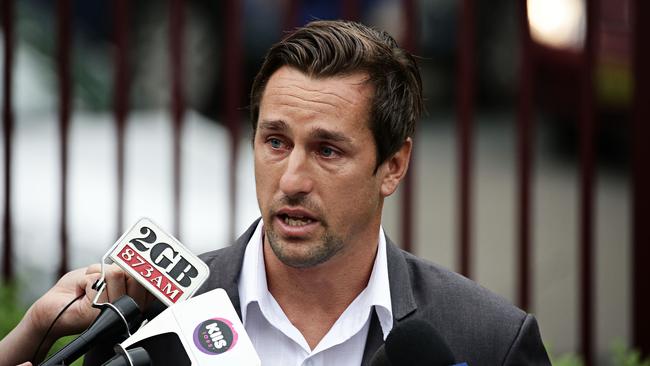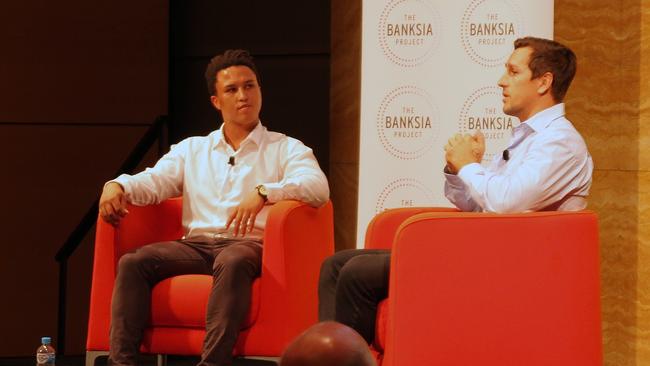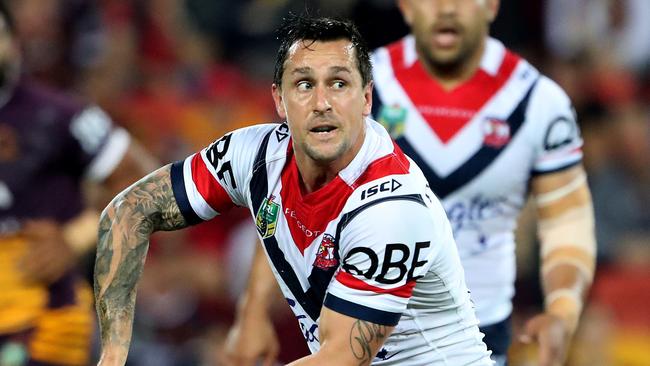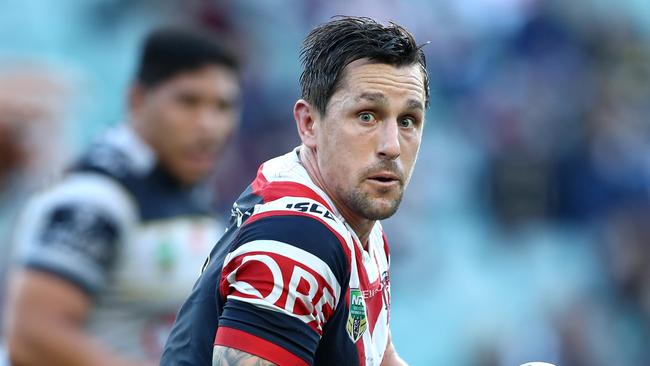Sydney Roosters star Mitchell Pearce brings his private battle into the open
MITCHELL Pearce has gone from being the game’s biggest embarrassment to a potential ambassador on the depression and suicide epidemic in society.

Roosters
Don't miss out on the headlines from Roosters. Followed categories will be added to My News.
A YEAR ago he was surrounded by heroin addicts and alcoholics in a Thailand rehab clinic. A broken man.
Fast-forward 12 months and Mitchell Pearce is sitting alongside eminent mental health experts addressing a group at the University of NSW about his darkest experiences.
It’s hard to believe it’s the same man. This incredible transformation of a mug to a mentor.
He’s gone from being the game’s biggest embarrassment to a potential leader and ambassador on the depression and suicide epidemic in society and his own sport, rugby league.
This is no PR stunt like a lot of the footy player “comeback” stories. Nothing manufactured.
Statistics reveal an incredible 23 per cent of players — which is nearly 200 players in the NRL and Holden Cup ranks — used counselling services last year for various issues.
Pearce was at the uni as a guest speaker of the Banksia Project at a mental health forum alongside crown prosecutor Margaret Cunneen SC, who has fought her own very public and depressing problems with ICAC before being cleared.

Professor Gordon Parker and Dr Rachael Murrihy, a senior clinical psychologist in the Health Psychology Unit at University of Technology, are part of the panel.
Professor Parker reveals the highest rate of depression among sportsmen is from cricket.
But Pearce is here to talk about his experiences, the high and lows, the mixture of praise and criticism, since bursting onto the NRL at 17, State of Origin at 19 and the pressure that comes from it.
“It was an honour to be invited,” Pearce said, “It needs exposure.
“Everyone’s in their own little world but the more vocal you are about it the more helpful it’s going to be for those suffering.
“It’s scary what’s happened in rugby league and to think of the number of lives we’ve lost.”
Not that Pearce contemplated suicide. But the statistics are horrendous.
The recent death of former Roosters and Parramatta forward Chad Robinson is just one of many tragic stories of rugby league players who have taken their own lives.

Often from the stress, the tension and the expectations combined with drugs and alcohol.
Pearce says: “A lot of that comes down to pressure. Pressure about money if they don’t make it, a serious injury that might force them into early retirement. They’ve got families and young kids.
‘They get depression and think there’s no way out.
“That why forums like this are so important and that men can talk about it.
“So many guys are killing themselves and in the NRL it’s a big problem.”
He talks openly of his own battles since last year’s infamous Australia Day incident when he was filmed simulating sex with a dog.
That he was fined $125,000 and suspended for eight weeks no longer matters.
More importantly it was the turning point and the beginning of his new life.
“It opened my eyes to a whole different world,” he said.
CRISIS: Where have all the cheapies gone?
DEREGISTER: Tigers star’s future in doubt
“The biggest thing for me was being in denial. I had this ‘poor me’ attitude. I was angry. Why did this happen. Who did the video? But I eventually decided I couldn’t keep running away. That I had a problem.
“Going to Thailand is the best thing that’s happened to me. At first I thought what am I doing here with heroin addicts and alcoholics?
“Then as we moved on it began to sink in. I looked at a video of me at a press conference before I went. I looked about 47. I feel so better now. . I’m the happiest I’ve been.”
His mum Terri and girlfriend Zoe Grant look on proudly.
He talks of the discipline and routine he now has in his life — meditation twice daily, reading books on positive thinking combined with his Roosters training.
“I had an erratic personality and I chased temptations,” he said, “Being in the spotlight made me insecure in different areas.
“I love a beer but I’ve come to terms with the fact it throws my personality out of whack. I was easily influenced.
“I didn’t realise it before but I do now. You just have to find other interests away from finding that high with alcohol. That’s what I’ve worked hard at doing.

“If you hang around good people it becomes contagious.”
NRL data shows that 13 per cent of players used their counselling service last year while an estimated 10 per cent more used other services (this may not be over mental health concerns; it could be relationship breakdown/alcohol or other reasons).
“We had three key focuses in 2016 — destigmatising or normalising mental health, promoting our services and working on a preventive strategy,” the NRL’s education and welfare manager Paul Heptonstall said.
“We have now expanded our use of the resilience program, which will be delivered not only to our elite players but to all junior representative players.”
Pearce remains cautious about the battle ahead. He still has the occasional drink socially but nothing like old benders.
“The war never stops,” he says, “There are always going to be temptations and it’s never going to be easy.
“It’s about discipline and I’ve worked out that interaction with the people you trust is the best therapy. Just try and stay positive. To come out the other side in a healthy state of mind means a lot to me.”



